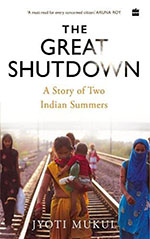Jyoti Mukul’s debut volume catalogues the ramifications of the nationwide lockdown announced on 24 March 2020; the subsequent shutting down of the Indian Railways which caused emotional turmoil to millions of migrant workers separated from their families amidst dire economic crisis and a health emergency; and the complete breakdown of the healthcare system during the second wave of the pandemic in 2021 leading to a humanitarian tragedy.
The COVID-19 pandemic presented an unprecedented scenario before the world at large. In March 2020, India, like the rest of the world, was still coming to terms with what the World Health Organization (WHO) declared to be a pandemic on 11 March. Part one of the book opens with the Directorate General of Civil Aviation (DGCA) and the Government of India issuing successive travel advisories related to screening of passengers from select countries, suspension of visas to India, screening of all incoming international passengers, mandatory fourteen-day quarantine for incoming travellers, followed by suspension of all international flights on 22 March 2020.
Travel by road was impacted even before the announcement of the lockdown. The insistence of States on cutting off boundaries with their neighbours stemmed from the ‘pressure that their healthcare services faced because of infection carried in by travellers and passed on to their residents.’
The run up to the lockdown was a preview of what was to follow during the three weeks of lockdown. There was a shortage of essential items while the long queues in front of the grocery stores only led to empty shelves. The announcement of the ‘Janata Curfew’ on 22 March caused apprehensions about further drastic measures being announced by the Government in an attempt to prevent further infections.

